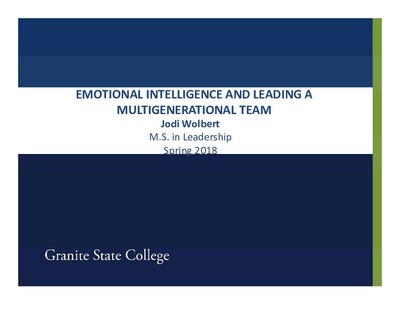Emotional Intelligence and Leading a Multigenerational Team
Emotional Intelligence and Leading a Multigenerational Team
| dc.contributor.author | Wolbert, Jodi | |
| dc.date.accessioned | 2022-01-05T14:36:28Z | |
| dc.date.available | 2022-01-05T14:36:28Z | |
| dc.date.semester | Spring 2018 | |
| dc.identifier.uri | https://archives.granite.edu/handle/20.500.12975/324 | |
| dc.description | A multi-generational workforce creates diversity in organizations. At present, there are four, and potentially, five generations of employees in the workplace. Various historical and social events have influenced each generation. The distinct life experiences of each generation have shaped workplace values and beliefs which in tum has created tension areas in the workplace. Leaders can tum those challenges into opportunities for the organization by drawing on the concept of emotional intelligence. Leaders with high emotional intelligence skills can regulate and manage their emotion, understand and empathetically relate to the emotion displayed by others, and leverage this skill to understand the generational differences to form an engaged team. The present research posited that a leader's level of emotional intelligence positively impacts job satisfaction along with employee engagement. | |
| dc.title | Emotional Intelligence and Leading a Multigenerational Team | |
| dc.title | Emotional Intelligence and Leading a Multigenerational Team |


